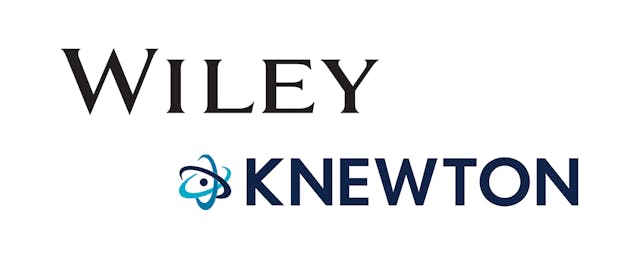In the second eye-raising deal for the higher-ed publishing industry in as many weeks, Wiley, a major textbook publisher, has agreed to acquire the assets of Knewton, a provider of digital courseware and adaptive-learning technologies. Financial terms of the deal, which is expected to close by the end of May, were not shared.
Publicly-traded companies like Wiley generally share the price of their acquisitions, unless the financial impact is considered immaterial to the buyer’s bottom line. Last year, Wiley disclosed paying $200 million in cash for The Learning House, a provider of online program management services for higher-ed institutions. It did not do so when it acquired Ranku, in a deal estimated at $25 million.
In that context, that non-disclosure may be revealing for how far Knewton, which has been one of the most well-funded education technology companies, has fallen short of financial expectations. The New York City-based company has raised more than $180 million in investment capital. EdSurge has learned there were other buyers bidding for Knewton’s assets, with the transaction prices discussed in the $10 million range.
No industry analyst we spoke with believes the sale price was anywhere near what Knewton had raised. The deal is framed in the announcement as a win for affordable courseware, but Knewton’s numerous investors would have liked to see a higher price tag for the transaction.
“It’s sort of a poorly kept secret that Knewton’s been trying to sell itself for a while now in what I call a fire sale,” says Phil Hill, a consultant and co-publisher at e-Literate.
To its critics (including Hill), Knewton’s product has long struggled to live up to its billing. Founded in 2008, Knewton blazed its way into the edtech industry with bold proclamations about its adaptive-learning technology, which it then licensed to digital curriculum providers. The pitch was that Knewton’s technology could help them glean where students may be struggling as they worked through course materials, and surface the appropriate content at the right time.
The claims attracted plenty of skeptics, like Hill’s partner at e-Literate, Michael Feldstein, who once called Knewton “snake oil.” And around 2017, publishers including Pearson that once used Knewton began to pull back.
Under Brian Kibby, who took over as Knewton’s CEO after Jose Ferreira stepped down in December 2016, the company attempted to remake itself with a new business: selling digital courseware directly to higher-ed institutions and students. Called “Alta,” the offering is a mix of openly-licensed materials powered by its adaptive learning technology, which the company claims is used in more than 300 colleges and universities today.
Wiley, once a major publisher of higher-education materials, has seen its education publishing business shrink over the years. In its latest fiscal year earnings summary (for Nov. 1, 2018 to Jan. 1, 2019), the company reported a more than 20-percent decline in this division. The education publishing business now makes up less than 10 percent of the company’s overall revenue. (By contrast, Wiley’s academic and research publishing business remains strong, contributing more than half of its revenue.)
To offset those losses, Wiley has been expanding its digital services business. Since acquiring Deltak in 2012, the company is now a major player in the online program management (OPM) business, which helps higher-ed institutions run online educational programs.
The purchase of Knewton would mark Wiley’s first acquisition of a digital courseware provider, said Renee Alteir, Wiley’s vice president and general manager of digital education, in an email interview. She added: “Knewton will integrate into Wiley’s existing Higher Education business. Alta is an ideal complement to our publishing strategy, our WileyPLUS platform [its online course and homework platform], and our efforts to promote more affordable curriculum and content solutions, which include print rental and inclusive access.”
The news also comes on the heels of a pending blockbuster merger between Cengage and McGraw-Hill Education, which industry analysts say is a bellwether not just for the future of the textbook business, but for how publishers transform themselves. (Knewton’s CEO Kibby formerly served as president of McGraw-Hill’s Higher Education Group.)
The close proximity of the two deals presents “an interesting juxtaposition, and two different worldviews in which publishing companies can go,” says Paul Freedman, CEO of Entangled Group. Both approaches, he believes, could mean lower costs for students.
In their merger, Cengage and McGraw-Hill are placing their bets on an unlimited subscription model for their digital offerings, which Cengage currently offers at $120 per term. Combined, the two companies say they will have 44,000 textbook titles, many of which are expected to be added to the Unlimited library.
Knewton’s Alta, by contrast, is tapping into openly-licensed, or OER, materials. It is currently available for $44 per course for two years of access, or $9.95 per month. But it covers a smaller range of subjects—mostly intro-level courses in chemistry, economics, mathematics and statistics. Should Knewton and Wiley continue to rely on OER to expand its general-ed courseware library, Freedman says, it could present an attractive and possibly more-affordable alternative.
Cengage and McGraw-Hill have also said they will not go into the OPM business, which is now a significant part of Wiley’s offerings.
The textbook publishing industry has long been trying to turn the corner in its transition to a digital business, and the recent flurry of deals suggest that the industry may finally be well on its way to a significant transformation.
Jeffrey R. Young contributed to this report.


